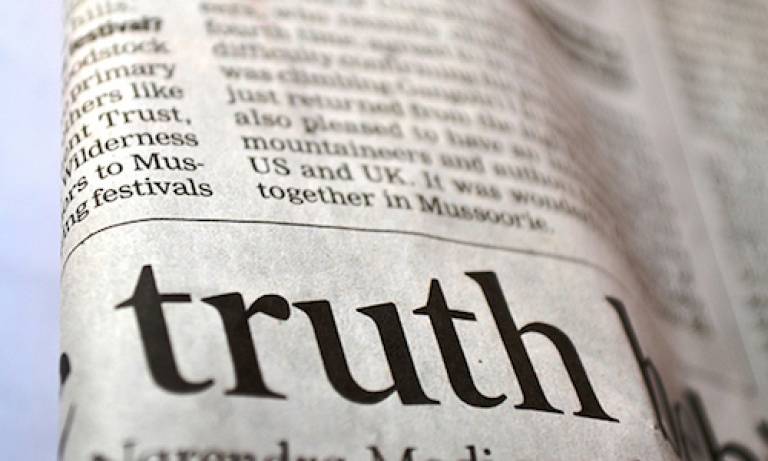Post-Truth? No: Post-Lie
16 February 2018
Seeking to move beyond the conventional wisdom that we now inhabit a 'post-truth' era, Peter Zusi reflects on what might be a more appropriate description of the current political climate.

The truism of 2016 was that we have entered the era of 'post-truth'. The OED defined its 2016 word of the year as 'relating to or denoting circumstances in which objective facts are less influential in shaping public opinion than appeals to emotion and personal belief'. The OED citation noted that the term has been around for a decade or two, but that it has finally entered general circulation in a way that allows mainstream media to use the term without further clarification. Politicians, of course, have always lied. But since 2016, it appears, lies carry no political consequence: transparent lies, demonstrated conclusively as such, sway public opinion none the less; lies caught 'after the fact' have no negative repercussion for their propagators, thus absolving them of responsibility for word or action. Lies seem no longer just an unfortunate admixture in political discourse: they are its basic medium.
What we have truly lost over the last several years, however, is not the notion of 'truth', but of 'lie'. Truth still exists. Indeed, it often seems there are too many truths. Yet it now seems almost impossible to lie. A paradox, naturally, for the terms are inherently connected. So what difference does this alternative formulation bring? In essence, 'post-truth' implies nihilism and is a phenomenon not of the last decade or two but is deeply embedded in late industrialized (or in cultural terms: postmodern) society of the mid- and late 20th century. 'Post-lying', by contrast, implies a degree of affective engagement that is not nihilist at all. Rather, 'post-lying' results precisely from weariness with the perceived banality and emptiness of the world since the Second World War, with the bureaucratization, levelling and caution of technocratic society. Post-lying thus paradoxically constitutes a desperate, or indeed neurotic, attempt to give life meaning. This is hardly re-assuring. If post-truth is inherently cynical ('nothing is true so it doesn't matter what you say') post-lying requires a hypertrophic belief in one's truth, belief that eclipses communication with other viewpoints. Post-lying is therefore hardened against persuasion. Here lies the kinship with interwar fascism (though the differences are at least as important as the parallels). One might object: Did we not witness in November 2016 the triumph of monumental opportunism? I think that is not quite accurate. There is a strange point where belief and conviction overlap with apparent opportunism: when one's conviction is that one is always right. Conviction without content, in other words-or without content other than personal infallibility.
For these reasons, post-lying does not represent the extension of 'postmodern' relativism-that bogey of the 1980s culture wars-into politics. The USA has not elected a postmodern president. For the postmodern, post-truth relativism was, despite the charge of nihilism its critics charged it with, far more open to dialogue. Post-lying, by contrast, listens only to itself.
Dr Peter Zusi is a Lecturer at UCL's School of Slavonic and Eastern European Studies as well as the School of Laws, Arts and Humanities, and Social and Historical Sciences. His interests range across modern Czech and German literature and culture, theory of modernism and the avant-garde, and the relation between literature and the visual arts, particularly architecture. He is co-editor of the journal Central Europe.
 Close
Close

